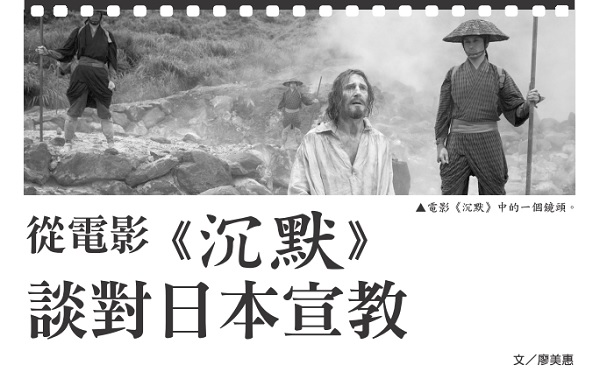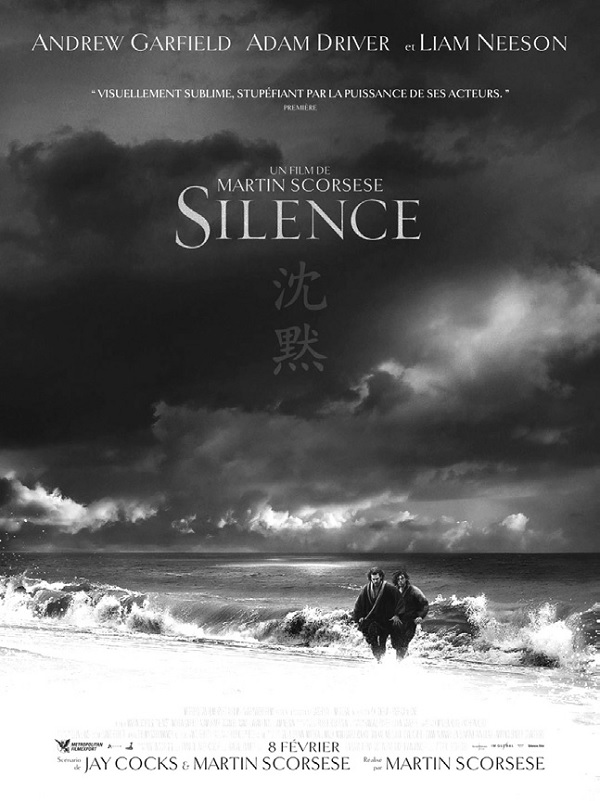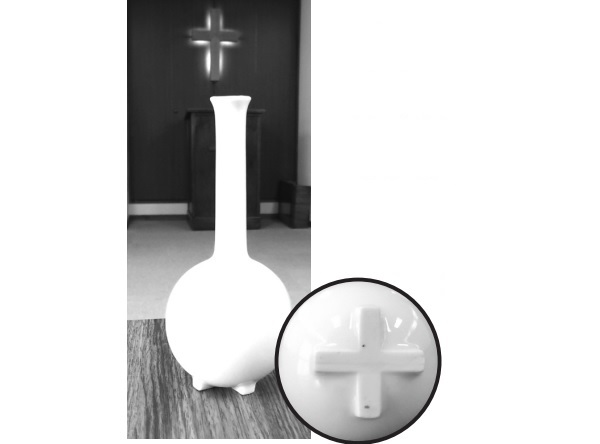Talking about missionary work to Japan from the movie "Silence"

Struggle and Contradiction
Internationally famous director Martin Scorsese, who once wanted to be a priest, spent 28 years sharpening his skills and finally completed the filming of his lifelong dream "Silence". It was the first time that a Hollywood movie was shot entirely in Taiwan. , and won the American Film Institute's 2016 "Top Ten Movies of the Year".
This film is adapted from the 1966 work "Silence" by the famous Japanese Catholic writer Endo Shusaku. Thank God for using two artistically talented writers and directors to use this film to allow Christians to deeply reflect on the core and value of faith, as well as the obstacles and historical and cultural background of missionary work in Japan.
Martin Scorsese said in an interview with the media: "'Silence' is about a man who understands through pain that God's love is more mysterious than he knows, and that He has left more ways for people than we know. , and He is always there... even when He is silent.”
This film describes the early seventeenth century, when the Tokugawa shogunate strictly prohibited citizens from practicing Catholicism, and violators would be brutally tortured. The Jesuits in Portugal received news that Ferreira, a devout priest sent to Japan to preach, had been captured and surrendered to power, betraying the church. This shocked and humiliated the church. Two of his disciples, Rodrigues and Garupe, could not believe this, and finally went to Japan to find out the truth. In the process of searching for their mentor and preaching, the two priests were hunted down and brutally suppressed by Japanese officers and soldiers. They experienced pain, trial, struggle, betrayal, and suffered great physical and psychological tests.
According to Japanese historical records, Father Ferreira in the film is a real person. As for the other two priests who went to Japan to find him, they are fictions of the writer Shusaku Endo. After watching this film, the author heard two different voices: First, no matter how severe the persecution was, Father Ferreira should not "abandon Christianity" and become the last missionary in Japan, which would lead to the loss of missionary roots in Japan. . It was not until the Meiji Restoration in the mid-19th century that Japan was again opened to missionaries.
Another voice is that Father Ferreira was only forced to compromise and appear to surrender. In fact, his "renunciation" was his "martyrdom." Because there was a crucial scene where he said to his disciple Rodíguez: "They died not because of their faith, but because of you. If Jesus were here, He would also abandon Christianity in order to save these people from suffering!"
Some Catholic rituals and symbols appear in the film, such as confession, idols, etc. This is because the author has a Catholic background. Whether to trample on paintings (trampling on images of Jesus or the Virgin Mary), or whether to abandon religion or not, may not be the focus of this film. The author and director have the same goal - to further explore faith. When all external forms of religion are not allowed, including sacraments, communions, and prayers, and even when there is suspicion that God has not listened to prayers, can Christians still hold on to the faith in their hearts?
The struggles and contradictions about faith discussed in the film are actually tests and challenges that every Christian may face. How can there be no conflict and pain of swings and struggles between the two poles of the worldly and the divine? For example, too often, we want to love someone but can’t.
There is an impressive character in the film who goes back and forth between struggle and contradiction-Kichijiro. Audiences may quickly draw parallels between him and Judas, the disciple who betrayed Jesus, as he betrays again and again, only to return to the priest again and again to confess. In Kichijiro, you can actually see a lot of yourself. I believe that every confession and confession made by Kichijiro is sincere, but like many people, no matter how hard he tries, he will be defeated again. This also reminds us that we must always look to Christ because human nature is so forgetful and weak.
The characters in this movie are constantly struggling with what faith is and constantly questioning and questioning "why God remains silent." To all the questions, the director doesn't seem to want to give simple, clear answers.

▲The internationally renowned director Martin Scorsese's "Silence" set a record for the first time that a Hollywood movie was shot entirely in Taiwan, and was selected as one of the "Top Ten Movies of the Year" in 2016.
Hard soil for missions?
據統計,日本二億二千萬人口中,基督徒(含天主教徒與新教徒)不到百分之一。新澤西州若歌教會兩年前開始與對日宣教機構接觸,負責的陳信評弟兄表示,因神奇妙的帶領,透過新澤西州一個宣教機構Liberty Conner Ministry(LCM1)開始踏上日本短宣之路。陳信評認為,對日本人傳教的確不容易,包含主觀和客觀因素。事實上,現在的日本政府對基督教的態度是開放的,但基於文化及歷史背景,一般日本人對基督教仍有偏見,認為基督教是「門戶極其狹窄的宗教」,與日本文化格格不入,是一種「洋教」,是一種「讓人穿起來不舒服的洋服」,曾迫害他們,最好與基督教保持距離,以免麻煩。
Chen Xinping watched the movie "Silence" twice, once in the cinema with his family, and once at home with members of the Japanese short-term mission team. I hope that by watching this film, I can gain a better understanding of the history and culture behind the difficulties of missionary work in Japan.

▲Two photos illustrate that for hundreds of years, there have been some "hidden Christians" in Japan. A seemingly ordinary vase turns out to have a cross hidden at the bottom. (Photo courtesy: Chen Xinping)
After watching the film for the first time, Chen Xinping said that he felt very depressed, dark, and uncomfortable; but after watching the film carefully for the second time, he finally understood the good intentions of the author and director. He even asked himself: "If I were Father Ferreira, if I were Rodíguez, what would I do? Will I abandon my religion? Or be martyred?" "Facing the silent sea, facing the silent God, I What should I do? What will God want me to do? "Does the form of religion matter?"
"Is Japan really a hard ground for the gospel?" In an interview with the author, Pastor Ueda, a local missionary of LCM, told a story about Japan's missionary history. She said: Japan was once a fertile ground for the gospel. The Japanese, like people all over the world, need to hear the gospel and are willing to accept the gospel. However, in the past, due to the interference of the government, people were unable to hear the gospel.
上田牧師所說日本曾是福音的沃土那段歷史,正是十六世紀中葉,耶穌會神父方濟各沙勿略2,與西班牙的二位神父進入日本平戶,以長崎為據點的傳教。當時傳教活動十分順利,日本天主教徒曾達到四十萬人。不過之後,歐陸開始新舊教之爭,並伴隨各國商貿糾紛蔓延至日本,加上佛教徒與天主教徒的衝突不斷升高,統治者豐臣秀吉即於1587年頒佈天主教禁令,開始逼信徒棄教,驅逐神父。那也正是本片的歷史背景。
Pastor Ueda said that the reason why she became a Christian was because Maria of LCM, an American missionary who loved Japan, dedicated thirty years of her time to Japan, and this fruit was born. "As a Christian or a pastor in Japan, you often feel lonely, but if you often think about Jesus' life on earth and God's words, you will gain strength." Pastor Ueda's church currently has about twenty members. Although the church is small, it has sent two missionaries to Southeast Asia. "I believe that God has not forgotten the Japanese, and Japanese Christians should not remain silent or lose touch with the Great Commission."

▲The Japanese short-term mission team of Ruoge Church took a group photo with Pastor Ueda (fifth from right) and LCM Maria missionary (second from left) at Ruoge Church in October 2016. Chen Xinping was first from left. (Photography: Liao Meihui)
Is God really silent?
Both Chen Xinping and Pastor Ueda affirmed, "No! God is not silent!" It's just that sometimes we are deceived and fail to hear God's voice. Or we need to have more patience and waiting, more faith and hope, and learn how to respond to God’s silence.
Similarly, Shusaku Endo and Martin Scorsese, who once sought the true meaning of faith, seemed to let us see the answer in the last scene of the movie: Father Rodriguez seemed to surrender, but in fact he remained unswerving until death. Another interpretation and practice of faith.
Isn’t this a summary of the Christian faith by the author and director? The protagonist of the film only removes the appearance of religion, but he has God in his heart. Because, as shown at the end of the film, I have always held my faith firmly in the palm of my hand.
Note:
1. Liberty Corner Ministry is the missionary agency of the parent church in Germany, and its missionary targets are specifically targeted at Taiwan and Japan. For more testimonies about missions in Japan, please go online to www.lcministryusa.org.
2. St. Francis Xavier 1506~1552, Spanish Catholic missionary, one of the founders of the Society of Jesus, the first Jesuit to spread the Catholic faith to Malacca and Japan in Asia.
 Author profile: Liao Meihui, from Taiwan, has a son and a daughter with her husband Wang Zhiyuan. Certified Montessori teacher, children’s Sunday school teacher at Ruoge Church in New Jersey, part-time student at North American Chinese Evangelical Theological Seminary, and special correspondent for Kingdom of God magazine. Calling: Teacher and literary work.
Author profile: Liao Meihui, from Taiwan, has a son and a daughter with her husband Wang Zhiyuan. Certified Montessori teacher, children’s Sunday school teacher at Ruoge Church in New Jersey, part-time student at North American Chinese Evangelical Theological Seminary, and special correspondent for Kingdom of God magazine. Calling: Teacher and literary work.
